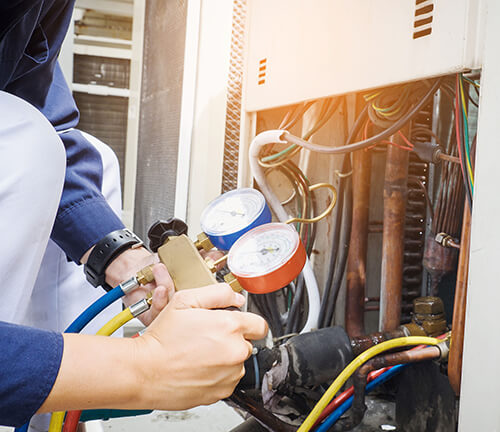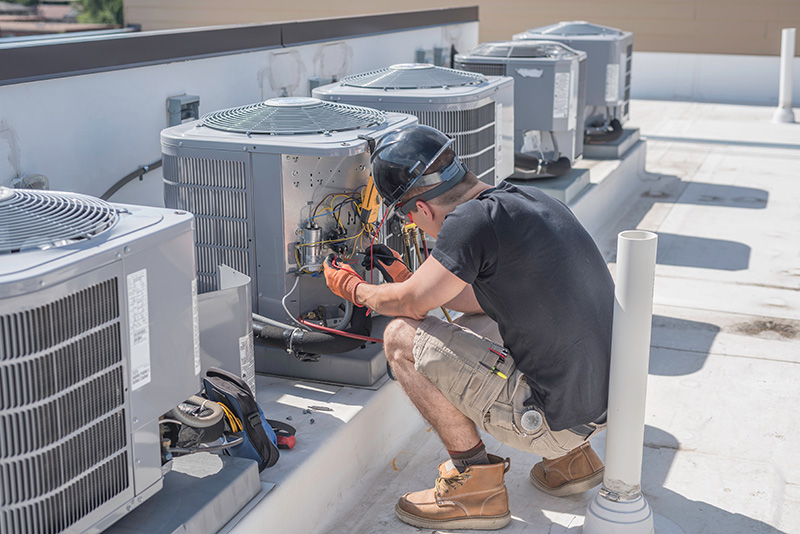Energy-Efficient Cooling And Heating Equipments to Minimize Utility Expenses
As power costs remain to increase, the importance of energy-efficient a/c systems comes to be significantly obvious. These systems not just promise significant cost savings on utility costs yet likewise add to a much more sustainable future by decreasing power consumption. With different choices readily available, consisting of geothermal heat pumps and ductless mini-splits, home proprietors face a plethora of selections that can improve convenience and air high quality. Understanding the vital features and maintenance needs is essential to taking full advantage of these advantages. What elements should be prioritized when choosing the best system for your requirements?
Benefits of Energy-Efficient Cooling And Heating Equipments
Energy-efficient HVAC systems supply many benefits that extend beyond mere price financial savings. One considerable benefit is the lowered ecological impact. By taking in less energy, these systems add to decrease greenhouse gas discharges, assisting to combat environment adjustment and advertise sustainability. This aligns with increasing societal needs for environmentally friendly practices in domestic and business setups.
In addition, energy-efficient HVAC systems commonly give boosted convenience levels. A lot of these systems feature advanced modern technology that allows for far better temperature level control and enhanced air top quality (DMAKS HVAC). This results in a much healthier interior environment, which is especially essential for people with allergies or respiratory system problems
Furthermore, buying energy-efficient cooling and heating systems can enhance property worth. As more customers prioritize power efficiency, homes and structures furnished with these systems may bring in higher quotes in the realty market.
Types of Energy-Efficient Cooling And Heating Options
How can house owners and businesses select the most appropriate energy-efficient heating and cooling choices for their needs? The marketplace provides a range of energy-efficient a/c systems, each made to boost comfort while decreasing power consumption.
One alternative is the variable cooling agent flow (VRF) system, which effectively regulates the temperature in multiple areas within a structure. This system adjusts its cooling agent circulation to match the desired temperature, bring about substantial energy financial savings.
One more popular option is geothermal heatpump, which make use of the earth's secure temperature to warm and amazing spaces. By transferring warmth to and from the ground, these systems demonstrate remarkable effectiveness, specifically in moderate environments.
Additionally, ductless mini-split systems supply an energy-efficient alternative for homes lacking ductwork. These systems enable zone-specific heating and air conditioning, lowering energy waste in vacant locations.
Lastly, high-efficiency heating systems and air conditioning system, with advanced SEER and AFUE scores, supply trustworthy climate control while taking in less power than conventional designs. By evaluating these choices, house owners and businesses can choose a cooling and heating system tailored to their certain demands and power efficiency goals.
Secret Functions to Take Into Consideration

Following, examine the kind of compressor utilized in the system. DMAKS HVAC. Variable-speed compressors can readjust their outcome to match the home heating or cooling need, leading to boosted comfort and energy financial savings compared to single-speed versions. Furthermore, seek systems geared up with clever thermostats that provide programmable setups and remote access, enabling far better control over energy consumption
An additional essential attribute is the system's air filtering ability. High-efficiency filters can enhance indoor air high quality and minimize energy usage by making sure the system operates successfully. In addition, take into consideration the kind of cooling agent utilized; contemporary systems typically utilize environment-friendly cooling agents that have a lower environmental impact.
Last but not least, make sure that the system works with zoning technology, which permits tailored temperature control in different locations of your home, improving comfort while reducing energy use.
Tips for Picking the Right System


Following, think about energy efficiency rankings, especially the Seasonal Energy Performance Proportion (SEER) for cooling systems and the Yearly Gas Usage Efficiency (AFUE) for furnace. Higher rankings suggest higher effectiveness, which can result in significant financial savings on energy bills over time.
Furthermore, examine the type of HVAC system that ideal suits your way of life and budget plan. Choices consist of central air, ductless mini-splits, and heatpump, each with its own set of advantages and drawbacks.
Do not ignore the importance of proper installation and sizing; an incorrectly sized system can result in inadequacies and boosted wear. Finally, seek advice from with a professional heating and cooling professional to acquire skilled recommendations tailored to your home's distinct demands. This comprehensive approach will make sure that you select an energy-efficient cooling and heating system that meets your demands and budget effectively.
Maintenance for Ideal Performance
When the right a/c system remains in area, recurring upkeep becomes essential to making sure optimum performance and durability. A properly maintained system runs more successfully, leading to lower power consumption and lowered energy bills. Normal evaluations and tune-ups ought to be set up at the very least twice a year-- as soon as before the cooling period and once before the home heating period.

House owners ought to additionally be attentive concerning monitoring their a/c system's efficiency. Uncommon noises, fluctuating temperatures, or raised power expenses can indicate underlying problems that require instant attention. By resolving these worries quickly, home owners can avoid expensive fixings and extend the life expectancy of their systems.
Purchasing a maintenance plan with a qualified professional not only enhances effectiveness however also supplies comfort, recognizing that the system is operating at its best. DMAKS HVAC. Routine upkeep is consequently essential for sustaining energy effectiveness and minimizing total functional costs
Conclusion
Finally, energy-efficient a/c systems offer a sensible solution for reducing utility bills while enhancing comfort and air quality. By incorporating advanced technologies and options such as geothermal heatpump and ductless mini-splits, homeowner can accomplish considerable energy cost savings and add to environmental sustainability. Careful factor to consider of system attributes and recurring upkeep additionally guarantees optimum performance, making energy-efficient systems a prudent financial investment for both economic and ecological benefits.